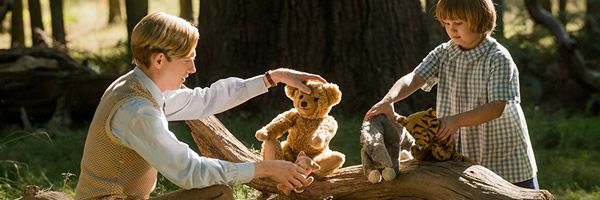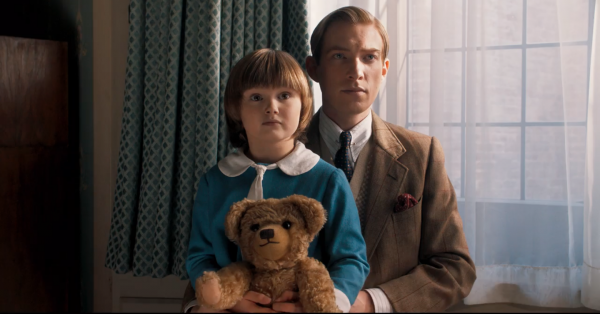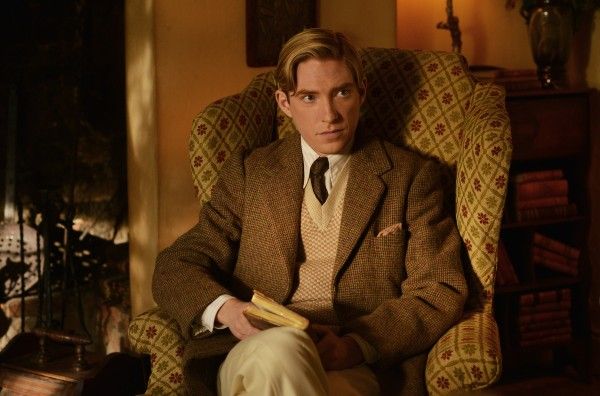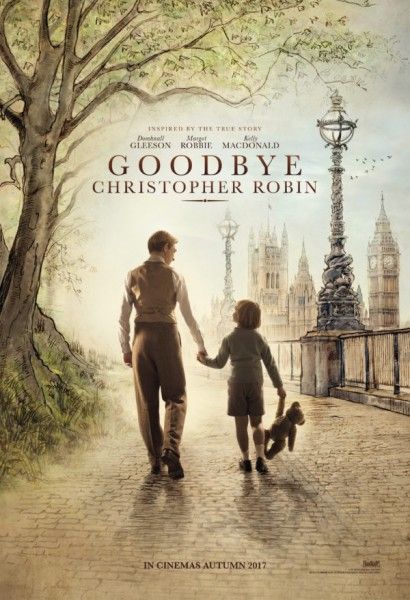Goodbye Christopher Robin is a movie that can never achieve escape velocity on the sadness that permeates its story. Despite the sun-dappled scenery, the wonder of imagination, a pat ending, and the creation of one of the most beloved children’s books of all-time, it’s still ultimately a story about a man who suffered from PTSD from World War I, sells his son’s playtime into a best-selling novel, and then sent that son off to World War II. Rather than embrace the sadness, Goodbye Christopher Robin keeps trying to be the whimsical, good-hearted Pooh without realizing that it’s truly Eeyore.
The story begins in 1941 when author A.A. Milne (Domhnall Gleeson) and his wife Daphne (Margot Robbie) receive tragic news, but before we can find out exactly what that news is, we cut back a couple decades to Milne having just returned home from World War I. Traumatized by his experiences, he moves Daphne and their new son Christopher Robin (Will Tilston) out to the country to try and get away from the hectic city life that causes Milne to experience painful flashbacks. Still unable to write, Daphne grows frustrated with Milne and leaves him and Christopher in the care of Christopher’s beloved nanny Olive (Kelly Macdonald). When Olive has to care for her sick mother, it leaves Milne trying to find common ground with his son, and in their playtime together, they discover the story of Winnie the Pooh.
Part of the film’s problem is that it’s not quite sure what sad story it wants to tell. The first act is all about Milne suffering from PTSD and his hatred of war. By using a war telegram as the framing device, the entire movie seems to revolve not around Winnie the Pooh, but how awful it is that a man should have to go off to fight in the “war to end all wars” only to have to send his son to fight in another world war. It’s the kind of story that could probably be told without Winnie the Pooh, but then there would be no “hook” even though that dynamic is a compelling tragedy of the 20th century and would probably be the kind of anti-war screed the real Milne would appreciate.
But in the second act, the movie shifts its focus almost entirely to Christopher Robin. Milne goes from being the lead to being a supporting character and we see how Christopher is upset at his childhood being sold off to people around the world. Again, this is a heartbreaking tale about thinking playtime with your dad is just something for the two of you and then the rest of the world feels entitled to it. That’s a huge weight to put at the feet of a child, and while Milne never meant to exploit his son, it still makes the young boy’s life far more difficult.
The movie then tries to reconcile these two stories, but by then the resolution feels far too tidy, and it’s made worse by how the film chooses to wrap things up. Goodbye Christopher Robin decides not to sit with the tragic storylines it gives us and instead decides to rest on a nice conversation. It’s a movie that’s gone in so deep with its tone of pleasant imagination that it’s almost oblivious to the kind of pain and torment its characters have experienced over the previous 90 minutes.
The worst thing about Goodbye Christopher Robin is that it breaks your heart on accident. The film director Simon Curtis thinks he’s making—one about the healing power of Winnie the Pooh—doesn’t line up with the pain his characters experience, which makes the overall film feel callow as a result despite the strong performances from the cast. Sometimes it’s okay to just feel sad, and if Curtis was hell-bent on putting a happy face on his characters circumstances, he shouldn’t have tried to find it in the closing minutes of his film.
Rating: C-




